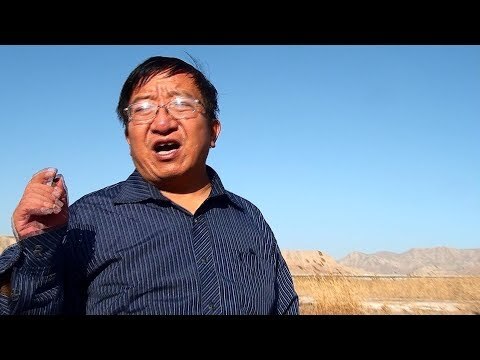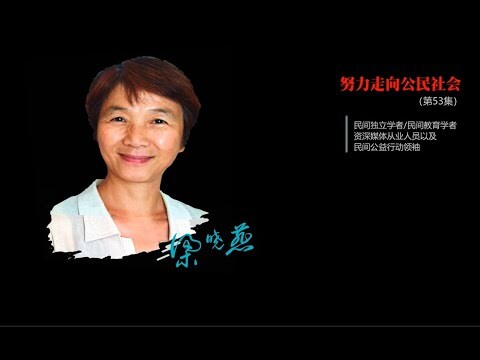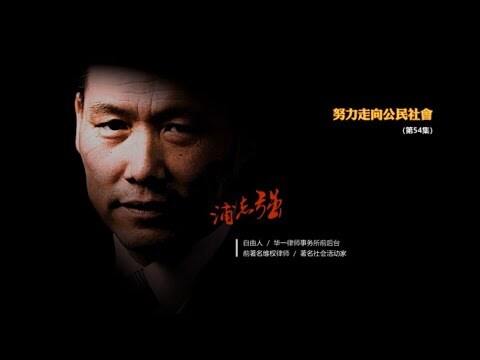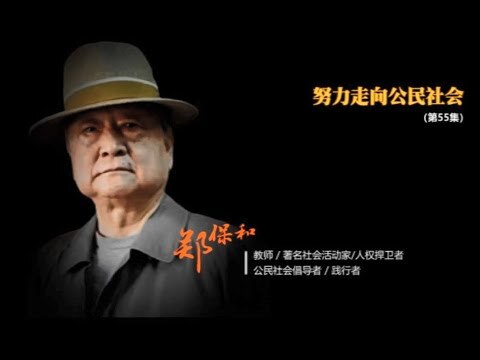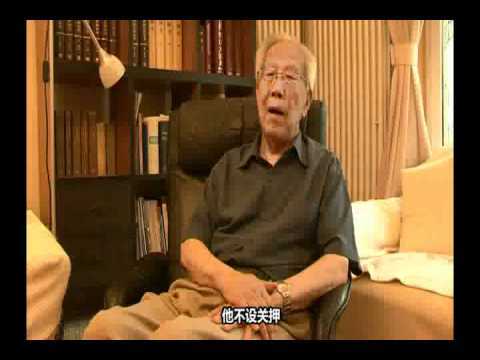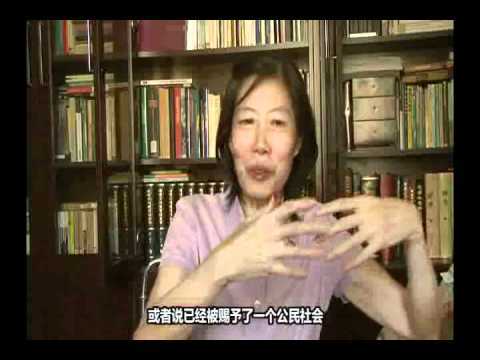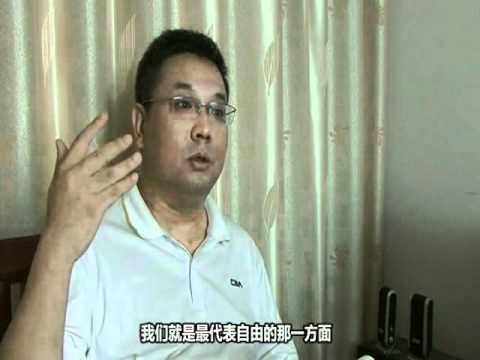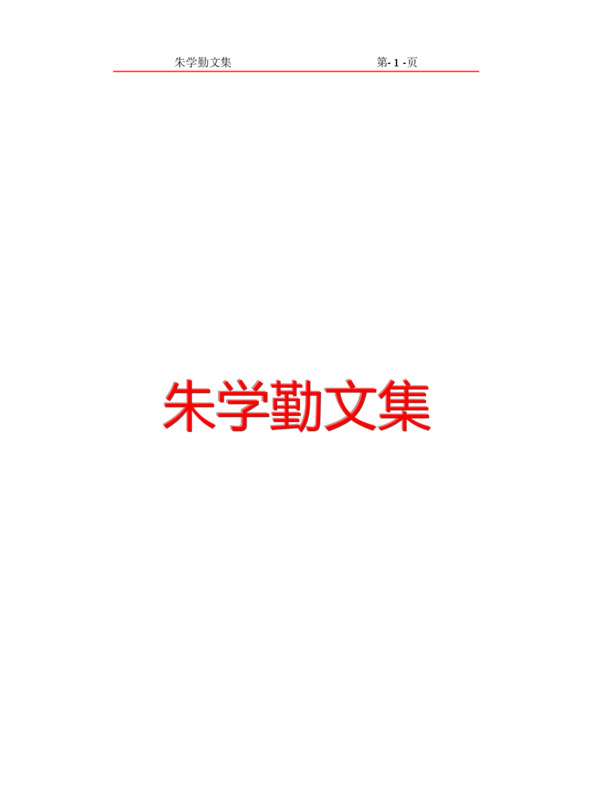Explore the collection
Showing 170 items in the collection
170 items
Film and Video
Working toward a Civil Society (Episode 52): Qu Mingxue
How can China build a true civil society? Since 2010, independent director Tiger Temple has conducted a series of interviews with scholars and civil society participants.
Film and Video
Working toward a Civil Society (Episode 53): Liang Xiaoyan
How can China build a true civil society? Since 2010, independent director Tiger Temple has conducted a series of interviews with scholars and civil society participants.
Film and Video
Working Toward a Civil Society (Episode 54): Pu Zhiqiang
How can China build a true civil society? Independent director Tiger Temple has conducted a series of interviews with scholars and civil society participants since 2010.
Film and Video
Working toward a Civil Society (Episode 55): Zheng Baohe
How can China build a true civil society? Since 2010, independent director Tiger Temple has conducted a series of interviews with scholars and civil society participants.
Film and Video
Working toward a Civil Society (Episode 6): He Fang
How can China build a real civil society? Since 2010, independent director Tiger Temple sat for a series of interviews with scholars and civil society actors.
Film and Video
Working toward a Civil Society (Episode 7): Guo Yuhua
How can China build a real civil society? Since 2010, independent director Tiger Temple sat for a series of interviews with scholars and civil society actors.
Film and Video
Working toward a Civil Society (Episode 8): Xu Youyu
How can China build a true civil society? Since 2010, independent director Tiger Temple has conducted a series of interviews with scholars and civil society participants.
Film and Video
Working toward a Civil Society (Episode 9): Zhang Hui
How can China build a true civil society? Since 2010, independent director Tiger Temple has conducted a series of interviews with scholars and civil society participants.
Film and Video
Xu Zhiyong
Chinese human rights activist Dr. Xu Zhiyong, twice imprisoned for his longstanding advocacy of civil society in China, was sentenced to 14 years in prison by the Chinese government in April 2023. The documentary by independent director Lao Hu Miao was filmed over a four-year period, beginning with the seizure of the Public League Legal Research Center, which Xu Zhiyong helped found in 2009, and ending with Xu's first prison sentence in 2014.
Book
Yangtze Yangtze
In March 1989, the book Yangtze Yangtze was published by the Guizhou People's Publishing House just as the Tiananmen student protests were about to begin in Beijing. The book fed into this intellectual ferment, challenging the technocratic reasons for the Three Gorges Dam, which eventually would dam the Yangtze River in the name of flood control and electrical power generation.
The book was edited by the journalist Dai Qing, the daughter of a well-known Communist Party activist and leader. The book challenged the project's decision-making process, with a broad array of scientists, journalists, and intellectuals arguing that it was not democratic and did not take into account all viewpoints. It was widely read in China and translated into foreign languages.
After the Tiananmen protests were violently suppressed, Dai Qing was arrested and imprisoned for ten months in Qincheng Prison as an organizer of the uprising. Yangtze Yangtze was criticized as “promoting bourgeois liberalization, opposing the Four Fundamental Principles (of party control), and creating public opinion for turmoil and riots.” The book was taken off the shelves and destroyed, with some copies burned. It became the first banned book resulting from the decision-making process of the Three Gorges Project.
The book is banned in China. The English-language edition can be read online at Probe International: https://journal.probeinternational.org/three-gorges-probe/yangtze-yangtze/.
Book
Zhao Ziyang’s Conversations Under House Arrest
In January 2007, Hong Kong Open Press published the book "Conversations of Zhao Ziyang under House Arrest". It was narrated by Zong Fengming and prefaced by Li Rui and Bao Tong. The narrator, Zong Fengming, is an old comrade of Zhao Ziyang. He retired from Beijing University of Aeronautics and Astronautics in 1990. From July 10, 1991 to October 24, 2004, using the name of a qigong master, Zong Fengming visited Fuqiang, who was under house arrest in Beijing. Zhao Ziyang, who lives at No. 6 Hutong, had hundreds of confidential conversations with Zhao Ziyang. This book is a rich account of these intimate conversations. Zhao Ziyang talked about the power struggle and policy differences within the top leadership of the CCP, his relationship with Hu Yaobang, his evaluation of Mao Zedong and Deng Xiaoping, his criticism of Jiang Zemin and Hu Jintao, Sino-US relations, the Soviet Union issue and Taiwan issues. He also conducted in-depth reflections on the history of the Communist Party.
Book
Zhu Xueqin Anthology
A collection of essays by Zhu Xueqin, a Chinese liberal intellectual. He has faced and criticizes various problems in China from a liberal point of view. Most of Zhu Xueqin's books were later banned.
图书
An Eyewitness Account of 1989 by a PLA Soldier
An Eyewitness Account of 1989 by a PLA Soldier is written by Cai Zheng. In 1989, Cai Zheng was serving in the People's Liberation Army Air Force in Beijing. On June 5th, near Tiananmen Square, he was arrested and severely beaten by martial law troops after he protested against the massacre. He was then detained for over eight months at the Beijing Xicheng Public Security Bureau and by his own military unit, enduring torture. Afterward, he was sent back to his hometown of Hong'an in Hubei province.
The book offers a detailed account of Cai Zheng's experiences as a soldier during the June Fourth crackdown and his subsequent struggles for survival in his hometown. It provides valuable insights for researchers seeking to understand China's social and historical environment before and after the events in 1989.
Published in 2009 by Mirror Books, this memoir is held in various public libraries in Hong Kong and by many university libraries worldwide. The book has also been subject to pirated editions within China.
图书
Summer of 1989: We Were in Beijing
<i>Summer of 1989: We Were in Beijing...</i> compiles numerous firsthand accounts detailing the experiences of students from The Chinese University of Hong Kong (CUHK) who were in Beijing and Shanghai during the 1989 democracy movement. A total of thirty CUHK students traveled from Hong Kong to Beijing to show their support.
The Hong Kong students interacted with student movement leaders at the time, attended meetings of the Beijing Students Autonomous Federation, participated in organizing efforts, and even edited a publication called <i>News Express</i>. They also set up a supply station of provisions in Tiananmen Square and supported the establishment of "Tiananmen Democracy University." A number of these students personally witnessed the June Fourth crackdown.
On the eve of the crackdown, official broadcasts in the square sternly criticized students from “a certain Hong Kong university” for forming illegal organizations. <i>People's Daily</i> directly named and criticized the Chinese University of Hong Kong Student Union on June 15th, after the crackdown occurred.
The Chinese University of Hong Kong Student Union published this book in 2014, stating its purpose as safeguarding history and combating official brainwashing. It also hopes that readers will understand the Tiananmen democracy movement from the perspective of Hong Kong students and to explore the role of CUHK and Hong Kong academia in this movement.
Article
China Labour Bulletin Report Series on Labor Rights Protection in China
On June 12, 2025, the Hong Kong–based NGO China Labour Bulletin (CLB) announced its dissolution. This marks yet another Chinese civil society organization that ceased operations following the implementation of the Hong Kong National Security Law. Founded in 1994, CLB was dedicated to promoting the Chinese labor movement and had long focused on labor rights in China. Headquartered in Hong Kong, its founder Han Dongfang was a workers’ leader during the 1989 Tiananmen Democracy Movement and one of the founders of the Beijing Workers’ Autonomous Federation.
Over the years, China Labour Bulletin published dozens of reports in Chinese and English on China’s labor movement, addressing issues related to migrant workers, food delivery couriers, women workers, child labor, coal mining, and pneumoconiosis, among others. Following the organization’s dissolution, the China Labour Bulletin website was also taken offline.
In response, the China Unofficial Archives website immediately downloaded and preserved 80 Chinese- and English-language reports from the site. The following 26 reports are studies on the labor rights protection in China published between 2004 and 2024, including titles such as “Research Report on China’s Food Delivery Industry,” “Labor Rights in the Construction Industry,” “Healthcare Workers’ Rights Report,” and “Workers’ Rights in the Manufacturing Sector,” among others.
Article
China Labour Bulletin Report Series on Workers' Movement
On June 12, 2025, the Hong Kong–based NGO China Labour Bulletin (CLB) announced its dissolution. This marks yet another Chinese civil society organization that ceased operations following the implementation of the Hong Kong National Security Law. Founded in 1994, CLB was dedicated to promoting the Chinese labor movement and had long focused on labor rights in China. Headquartered in Hong Kong, its founder Han Dongfang was a workers’ leader during the 1989 Tiananmen Democracy Movement and one of the founders of the Beijing Workers’ Autonomous Federation.
Over the years, China Labour Bulletin published dozens of reports in Chinese and English on China’s labor movement, addressing issues related to migrant workers, food delivery couriers, women workers, child labor, coal mining, and pneumoconiosis, among others. Following the organization’s dissolution, the China Labour Bulletin website was also taken offline.
In response, the China Unofficial Archives website immediately downloaded and preserved 80 Chinese- and English-language reports from the site. The following 15 reports are observation reports on China's workers' movement.
文章
China Labour Bulletin Report Series on Trade Union Reform
On June 12, 2025, the Hong Kong–based NGO China Labour Bulletin (CLB) announced its dissolution. This marks yet another Chinese civil society organization that ceased operations following the implementation of the Hong Kong National Security Law. Founded in 1994, CLB was dedicated to promoting the Chinese labor movement and had long focused on labor rights in China. Headquartered in Hong Kong, its founder Han Dongfang was a workers’ leader during the 1989 Tiananmen Democracy Movement and one of the founders of the Beijing Workers’ Autonomous Federation.
Over the years, China Labour Bulletin published dozens of reports in Chinese and English on China’s labor movement, addressing issues related to migrant workers, food delivery couriers, women workers, child labor, coal mining, and pneumoconiosis, among others. Following the organization’s dissolution, the China Labour Bulletin website was also taken offline.
In response, the China Unofficial Archives website immediately downloaded and preserved 80 Chinese- and English-language reports from the site. The following 18 reports are studies concerning trade union reform in China.
电影及视频
Global Feminisms Project: China Interviews
The Global Feminisms Project, hosted by the University of Michigan, archives oral history interviews with individuals who identify themselves as working on behalf of issues related to women and gender in different national contexts. The goal of the project is to encourage teachers and researchers to study issues related to the many forms of feminist or women’s movement activism in general, as well as activism on behalf of particular issues.
Beyond that, this project is also a useful resource for general readers who are interested in learning more about the history of feminist movements around the world. Interviewees describe their lives, their views, and their activism in considerable detail. The project offers the unedited interviews as primary sources for understanding the history of activism in all its complexity and variation.
The project covers 14 countries, including China, with each having a dedicated site. According to introductions by Wang Zheng, then a professor at University of Michigan’s Institute for Research on Women and Gender, the China Interviews took place in two phases.
In the first, the interviews illustrate the multi-dimensional development of feminist practices in China’s transformation from a socialist state economy to a capitalist market economy from the mid-1980s, when spontaneous women’s activism emerged. Situating such development in the context of both global capitalism and global feminisms, especially in the context of the Fourth UN Conference on Women (FWCW) when Chinese feminists came into direct contact with global feminisms, the interviews, conducted in the early 2000s, explore the cultural, social, and political meanings of Chinese feminist practices. They illustrate how official, non-official, domestic, and overseas Chinese women activists expressed diverse visions of gender equality, even engaging in struggles over the very word “gender.”
These interviews reflect the scope and complexity of the contemporary Chinese women’s movement. Feminist activists include women leaders from diverse groups, such as Ge Youli, who was involved as a young leader in various urban based organizational activities funded by international donors to disseminate feminist ideas; Zhang Lixi, Vice President of the Chinese Women’s College that affiliates with the All-China Women’s Federation, who has promoted women’s studies in her college; Ai Xiaoming, prominent feminist scholar and activist; and Gao Xiaoxian, who holds an official position in the Shaanxi Women’s Federation while creating several women’s organizations outside the official system to engage in legal services for women, anti-domestic violence movements, and issues of gender and development.
In the second phase, five interviews of a younger cohort of Chinese feminists record the rapidly contracted public space for NGO activism in China since the second decade following the FWCW and severe surveillance by the state over feminist activities initiated by autonomous feminist groups and individuals. They also provide powerful testimonies to tremendous creativity, perseverance and courage demonstrated by young feminists who in many cases are making a precarious living in the private sector without much resource for their feminist activism.
<a href=”https://sites.lsa.umich.edu/globalfeminisms/interviews/china/”>The China site</a> provides videos and transcripts of the interviews (both in Chinese and English). In addition to the interviews, the archive also provides maps, statistics, a timeline, podcasts and other resources to assist understanding of the context in which the activists carried out their work.
Film and Video
Beijing's Petition Village
In China, individuals can complain to higher authorities about corrupt government processes or officials through the petition system. The form of extrajudicial action, also known as "Letters and Visits" (from the Chinese xinfang and shangfang), dates back to the imperial era. If people believe that a judicial case was concluded not in accordance with law or that local government officials illegally violated his rights, they can bring it to authorities in a more elevated level of government for hearing, re-decide it and punish the lower level authorities. Every level and office in the Chinese government has a bureau of “Letters and Visits.” What sets China’s petitioning system apart is that it is a formal procedure—and as Zhao Liang's documentary shows, the system is largely a failure.
A residential area near Beijing South Railway Station was once home to tens of thousands of residents from all over the country. Known as “Petition Village,” its bungalows and shacks were demolished by authorities several times, but many petitioners still clung to the land in search of a clear future. _Beijing Petition Village_ portrays the village in the midst of this upheaval, focusing on the thousands of civilians who travel from the provinces to lodge their complaints in person with the highest petitioning body, the State Bureau of Letters and Visits Calls in the province, only to repeatedly get the brush-off by state officials. Ultimately, in 2007, Petition Village was demolished for good.
The film went on to win the Halekulani Golden Orchid Award for Best Documentary Film at the 29th Hawaii International Film Festival, and a Humanitarian Award for Documentaries at the 34th Hong Kong Film Awards.
图书
Tangni Kütüp/Awaiting for the Dawn
(English follows) “Tangni Kütüp” namliq bu eslime épik dastan uslubida, yeni she’iriy shekilde yézilghan eser bolup, 1930-yillardin 1980-yillarghiche bolghan Sherqiy Türkistan (Xinjiang)ning siyasiy we ijtima’iy tarixini xelq éytimidin chüshinishte muhim ehmiyetke igidur.
Aptor Abduqadir Zununi Uyghurlarning 20-esirdiki siyasiy we ijtima’iy hayatida yüz bergen zor weqelerge shahit bolghan, shundaqla shu jeryandiki nurghun ishlarni öz béshidin ötküzgen shexstur. U 1940-yillardin bashlap Sherqiy Türkistanda neshir qilin’ghan Uyghur tilidiki asasliq gézitlerning tehriratida tehrir we bash muherrir bolup ishligen. Yene bir tereptin edebiy ijadiyet bilen shoghullinip, Uyghurlar hayatida yüz bergen zor ijtima’iy özgirishler we siyasiy heriketlerni yéqindin közetken.
Bu eslime bir tarixiy shahitning közidin Sherqiy Türkistanning yérim esirlik siyasiy we ijtima’iy hayatini hökümet meydanidin emes, belki shu tarixni yaratquchi awam xelqning éytimidin bayan qilip bergen. Mezkur eslime aptor tughulghan 1919-yilidin bashlap, tarixiy xironologiyelik tertip boyiche 1920-yillardiki Sherqiy Türkistanning jem’iyet ehwali, 1930-yillarning bashlirida yüz bergen Sherqiy Türkistan inqilabi we Uyghurlarning milliy musteqilliq heriketliri, Xitay militarist Shéng Shiseyning 1930-yillarning ikkinchi yérimidin bashlap élip barghan qanliq qirghinchiliqi, 1944-yili partlighan Ili inqilabi we uning netijiside qurulghan Sherqiy Türkistan Jumhuriyiti, Aptorning 1940-yillarning ikkinchi yérimida Chöchekte “Xelq Awazi” gézitide ishligen mezgildiki kechürmishliri tepsiliy bayan qilin’ghan. Eslimining kéyinki bölikide 1949-yilining axiri Xitay Xelq Azadliq Armiyesining Sherqiy Türkistan’gha bésip kirishi, Ilidiki Sherqiy Türkistan Jumhuriyitining emeldin qélishi we Milliy Armiyening Xitay Xelq Azadliq Armiyesining 5-korpusi qilip özgertilishi, Kommunist Xitay bilen Sowét ittipaqining 1950-yillarning bashliridiki Sherqiy Türkistanni sehne qilghan “shirin’ay munasiwiti” qatarliq témilar bir shahitning közidin bayan qilin’ghan.
Bu eslimidiki eng muhim mezmunlarning biri, aptorning Kommunist Xitay ishghalidin kéyin, yeni 1949-yilidin 1955-yilighiche bolghan ariliqtiki körgen we bilgenliridur. Aptor bir kespiy jurnalist, shair we közetküchi bolush salahiyiti bilen öz eslimiside Kommunist Xitay ishghalidin kéyinki Sherqiy Türkistanning künsayin nacharlashqan siyasiy weziyiti we mustebit tüzümning Uyghur xelqining siyasiy arzulirini qandaq qilip birmu-bir köpükke aylandurghanliqini inchikilik bilen teswirligen. Bolupmu sabiq Sherqiy Türkistan Jumhuriyiti (1944-1949) ning hayat serxilliri bilen Uyghur xelqining Kommunist Xitay hakimiyitige qoshulushtiki eng töwen sherti – Sowét Ittipaqi modélidiki Sherqiy Türkistan/Uyghuristan Ittipaqdash Jumhuriyiti qurush – telipining qandaq qilip ret qilin’ghanliqi, uning ornigha Xitayche uslubtiki atalmish milliy téritoriyelik aptonomiye – “Shinjang Uyghur Aptonom Rayoni”ning ustiliq bilen dessitilgenliki, shundaqla uning saxta mahiyiti inchike détallar bilen körsitilgen. Aptor bu eslimiside Xitay Kompartiyesining Xitay tarixidiki féwdalliq sulalilerning chégra xelqlirini “bölüp bashqurush” taktikisidin ustiliq bilen paydillanghanliqi, aldi bilen pütkül Xitay téritoriyesining altidin bir qismini teshkil qilidighan Sherqiy Türkistanni Qazaq, Mongghol, Qirghiz, Tunggan qatarliq rayondiki sani az milletlerning namida 5 aptonom oblast, 6 aptonom nahiye we nechche onlighan aptonom milliy yézilargha parchilighanliqi, eng axirida asasliq yerlik millet bolghan Uyghurlarning namida “eti ulugh suprisi quruq” ölke derijilik “Shinjang Uyghur Aptonom Rayoni”ni qurup chiqqanliqini tepsiliy bayan qilghan. Aptorning özimu “Shinjang Géziti” Uyghur Tehrir Bölümining bash muheririr bolush süpiti bilen 1950-yillarning bashliridiki bu weqelerge biwasite shahit bolghan bolup, eslimiside bu jeryanlarni öz eyni boyiche inchike bayan qilghan.
Eslimining axiriqi qismi aptorning 1955-yili wetendin ayrilip, a’ilisi boyiche Sowét Ittipaqigha köchüp ketkendin kéyinki musapirliq hayatigha béghishlan’ghan. Aptorning 1950-yillarning ikkinchi yérimida Tashkenttiki “Sherq Heqiqiti” Neshriyatining Uyghur bölümide tehrir bolup ishligenliki, 1960-yillarda Sowét Ittipaqining Tashkentte tesis qilghan Xitaygha qarshi Uyghurche radio anglitish bölümide xizmet qilghanliqi, 1979-yili pénsiyege chiqqandin kéyin, nurghun qétim iltimas sunup axirida, yeni 1986-yili ayrilghili 30 yildin ashqan wetini Sherqiy Türkistanni ziyaret qilghanliqi bilen axirlashqan.
Bu eslime 1991-1993-yilliri ariliqida Tashkentte yézilghan. Bu Sabiq Sowét Ittipaqi parchilinip, Ottura Asiyada 5 musteqil dölet dunyagha kelgen, Uyghurlarning Ottura Asiya Döletlirini merkez qilghan muhajirettiki milliy musteqilliq heriketliri kücheygen mezgiller idi. Bu waqitta 75 yashqa kirgen aptor qoligha qelem élip, özining bir ömürlük kechürmishlirini Sherqiy Türkistanning 20-esirdiki tarixiy jeryanigha birleshtürüp yézip chiqqan, shundaqla bu eslimide yene Uyghurlarning milliy musteqilliq iradisi bilen aptorning shexsiy arzulirinimu melum derijide eks-ettürgen.
Aptor hayat waqtida bu eslimisini resmiy neshir qilish imkaniyitige érishelmigen. Aptor wapat bolghandin kéyin, bu eslimining qolyazmisi muhajirettiki Uyghurlar arisigha tarqilip, bir qisim Uyghurche tor betlerde tonushturulghan.
<i>Awaiting for the Dawn</i> is an epic narrative memoir written in verse form that chronicles the political and social transformations of East Turkestan (Xinjiang) from the 1930s to 1980s, providing a precious text for understanding this history from a witness’s perspective. The author, Abdukadir Zununi, was both a witness to major changes in 20th-century Uyghur society and a senior editor and literary creator for major Uyghur-language newspapers in East Turkestan from the 1940s onward. This dual identity gives the work unique historical depth.
This work breaks through the framework of official historiography, using grassroots narrative to reconstruct half a century of East Turkestan's historical landscape: from the Uyghur socio-political situation in the 1920s, the East Turkestan revolution and national independence movement of the 1930s, and the bloody rule of warlord Sheng Shicai, to the Ili Revolution that erupted in 1944 and the establishment of the East Turkestan Republic. The author provides detailed accounts of his experiences at the Uyghur-language Voice of the People, the newspaper which published in Chöchek (Tarbaghatay/Tacheng) during the East Turkestan Republic’s period in 1945-1949, as well as major events including the occupation of East Turkestan by the Chinese People's Liberation Army in late 1949, the dissolution of the East Turkestan Republic headquartered in Ili, the reorganization of the National Army into the Fifth Corps of the Chinese People's Liberation Army, and the geopolitical maneuvering during the Sino-Soviet “honeymoon period” in Xinjiang in the 1950s.
The memoir's core chapters focus on the dramatic social changes in East Turkestan under Chinese Communist rule from 1949-1955. With the keen eye of a professional journalist, the author records how the CCP's totalitarian system crushed Uyghur national political aspirations—the Soviet model concept of an “East Turkestan/Uyghurstan Union Republic” was brutally rejected and replaced with the “Xinjiang Uyghur Autonomous Region,” which promised autonomy but did not grant it. In this memoir, the author details how CCP authorities continued the “divide and rule” governance strategy of China's historical feudal dynasties, first dividing the East Turkestan territory (which comprises one-sixth of China's land area) into 5 autonomous prefectures, 6 autonomous counties, and dozens of ethnic townships named after minority populations including Kazakhs, Mongols, Kyrgyz, and Hui, ultimately establishing under the name of “Xinjiang Uyghur Autonomous Region”, which “bears the Uyghur name but operates as a hollow shell.” The author's perspective as editor-in-chief of the Uyghur edition of Xinjiang Daily lends credibility to his insider narrative.
In the latter part of the memoir, the author recounts his career after fleeing to the Soviet Union in 1955: serving as Uyghur editor at Oriental Truth Publishing House in Tashkent in the late 1950s; participating in Soviet government-established Uyghur-language broadcasts to China from Tashkent in the 1960s; and the complex emotions surrounding his return to East Turkestan in 1986 after multiple applications following his 1979 retirement—a homeland he had been separated from for over 30 years.
The memoir was completed between 1991-1993 in Tashkent, coinciding with the dissolution of the former Soviet Union, the independence of the five Central Asian states, and a surge in overseas Uyghur independence movements. The 75-year-old author wove his life experiences into the intersection of personal destiny and 20th-century East Turkestan history, while expressing both national independence ideals and personal sentiments.
The hand-written memoir manuscript was not formally published during the author's lifetime. After his death, it scattered like sparks throughout overseas Uyghur communities, being secretly copied in Istanbul coffeehouses and underground reading circles in Almaty and Tashkent. Some Uyghur-language websites have published excerpts. CUA offers a PDF of the original handwritten manuscript.
